Kamala Harris and the US state looking to take down Trump
- Published
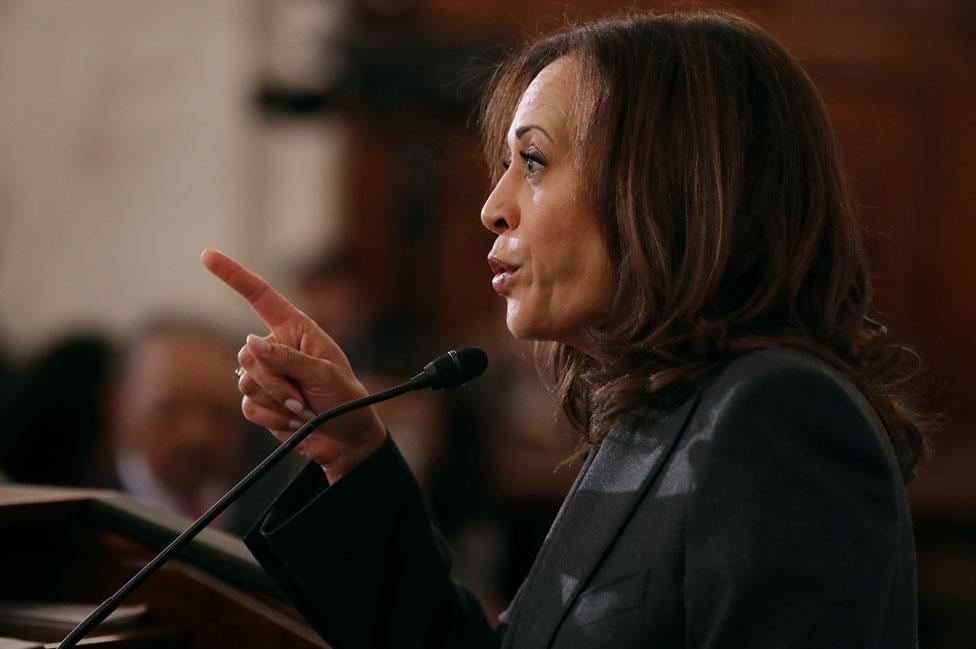
Kamala Harris is an early front-runner for 2020, despite criticism of her record
The propulsion of senator and lawyer Kamala Harris to front-runner status among the Democrats hoping to take on President Donald Trump in 2020 has underlined the resurgent political power of her home state.
A California senator is one of the front-runners for the 2020 Democratic presidential nomination.
A California congresswoman is Speaker of the House of Representatives.
California's new governor is a young, progressive champion promising to offer an alternative to the "corruption and incompetence" of Donald Trump's White House.
The so-called Golden State has become solidly Democrat blue, and its politicians are flexing their muscles on the national stage. But this golden opportunity doesn't come without risk for the progressive cause.

Big - but risky - predictions for Harris
A campaign kick-off is a political show of force. It's a chance to demonstrate that a candidate's appeal exists beyond op-ed think-pieces, lines on a fund-raising report or clicks on a social media post. Nothing drives home the potential of ballot-box success quite like a throng of faces in a cheering crowd.
On a warm Sunday afternoon at a public square in Oakland, California, Kamala Harris made just such a statement, packing in an estimated 20,000 people as she officially launched her presidential bid.
"These are not ordinary times, and this is not an ordinary election, but this is our America," the California senator said. "At stake is not the leadership of our party and our country. It is the right to moral leadership of this planet."
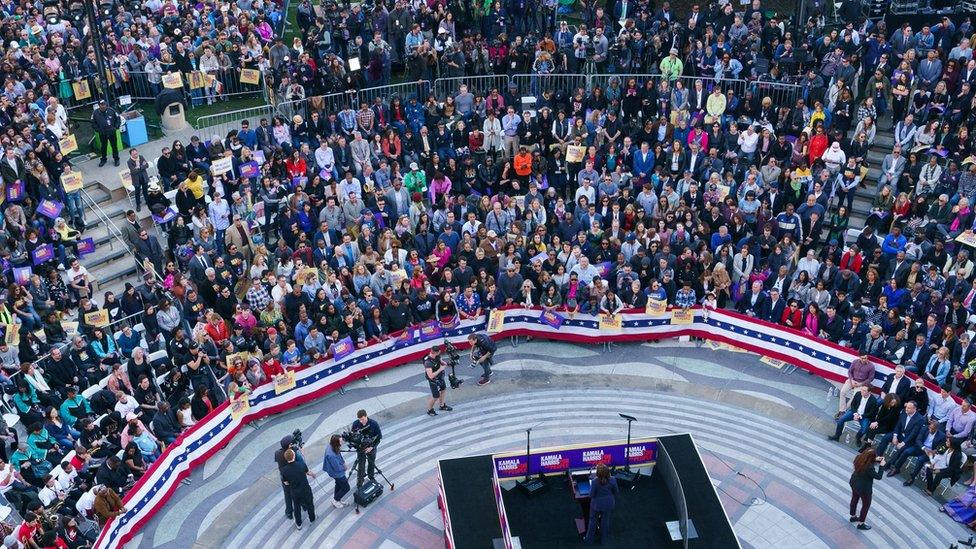
Thousands of people watched Kamala Harris officially launch her presidential bid
Her speech, carried live on US cable news networks, was geared towards a national audience, including promises of universal healthcare and pre-kindergarten childcare, debt-free college, a working- and middle-class tax cut, and an immigration system that welcomes refugees and provides some undocumented migrants a pathway to citizenship.
The choice of this northern California city across the bay from San Francisco to launch her campaign, however, was no accident for the woman just two years into her first term in Washington.
It's where Ms Harris, the daughter of immigrants from India and Jamaica, was born. It's also where she first held public office, as a deputy district attorney.

The consensus is that Kamala Harris is the front-runner among the Democrats hoping to reach the White House
Oakland, she notes, is where she stood before a judge as a prosecutor for the first time and said "five words that would guide my life" - "Kamala Harris, for the people".
It's a line she has now adopted as her campaign slogan.
Ms Harris would go on to rise through the ranks, first as San Francisco district attorney and then California attorney general, before making the leap to the Senate.
"It's exciting to see someone from California, from the Bay area, run for president," says Danny Marquis, a dentist from San Francisco who brought her 11-year-old son, Gabe, to the event.
"She represents some of my values, somebody who's hardy, who has been out there and who has walked the walk that I'm on right now, who will fight for and represent people like me."
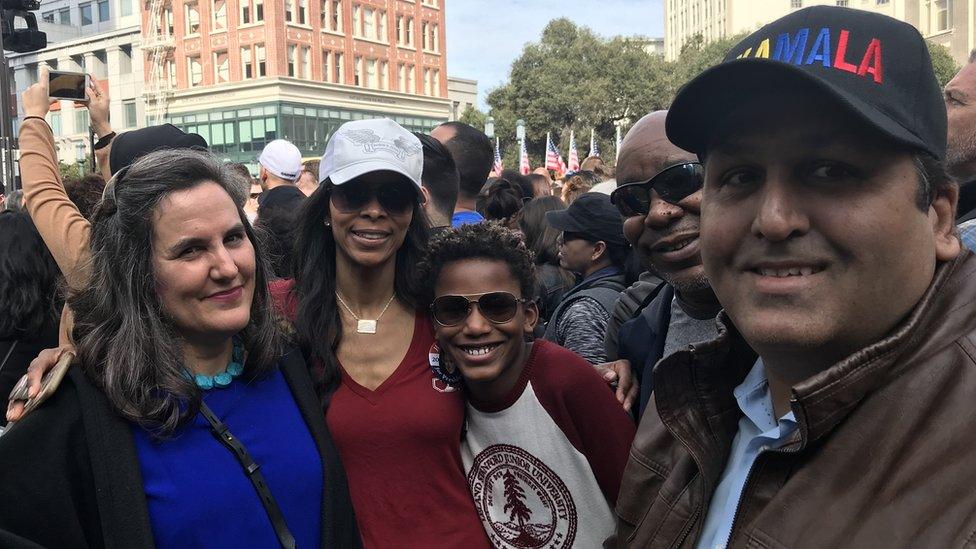
Danny Marquis (second from left), next to her son Gabe, says Kamala Harris represents some of her values
Ajay Bhutoria, a Fremont, California, business consultant who served on the national finance committee for Hillary Clinton's 2016 presidential campaign, says the turnout on Sunday shows just how desperate people are for change.
"California is the leader in innovation, and they're sending a message today," he says. Bhutoria adds that while he's still keeping an open mind over whom he will support, Ms Harris is a "great candidate".
The senator's potential was being heralded on the national level even before Sunday's choreographed launch in front of her hometown fans.
Liberal cable news host Rachel Maddow recently said Ms Harris had a "good chance" of being the 2020 Democratic nominee. An analysis on the election forecasting site fivethirtyeight.com, external said she "comes out looking stronger than any other potential candidate".
New York Times columnist David Leonhardt wrote a piece, external titled, simply, "Kamala Harris, a front-runner".
Given the size of the field - and the fact that the first nominating contest is more than a year away - these kinds of predictions are risky. At this point in 2015, many Republicans were busy fitting Jeb Bush with their party's crown, after all.
The conventional consensus, however, is that Ms Harris is at the head of the pack - and California is a big reason why.
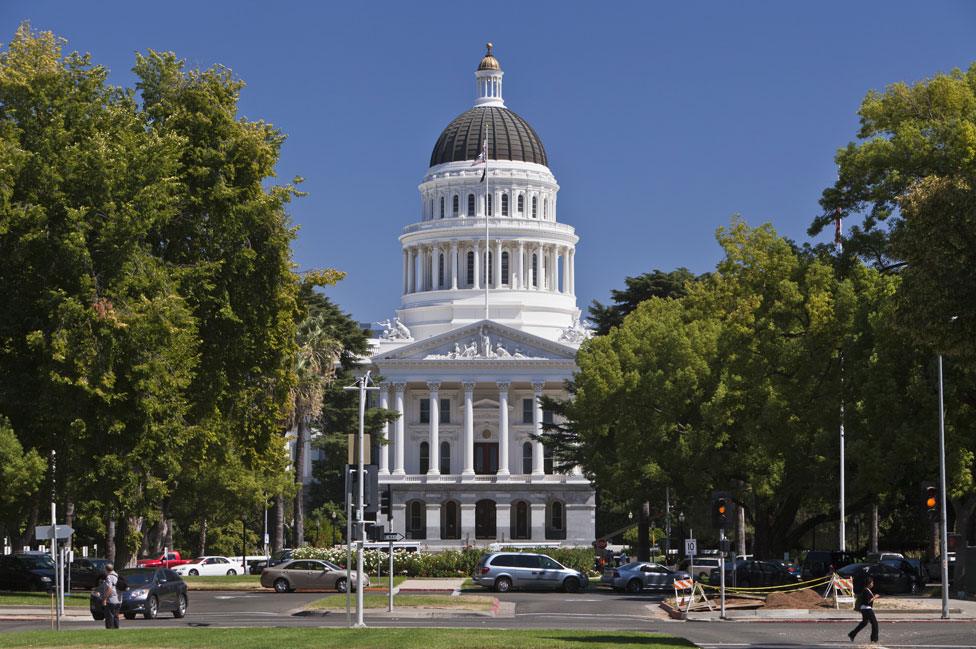
California state capitol in Sacramento
The state is a fund-raising power base with little parallel. In the 24 hours after Ms Harris announced, she reported $1.5m (£1.1m) in donations, breaking a record set by Senator Bernie Sanders in 2016.
Last year her campaign committee and related fund-raising organisations brought in more than $23m, external, with six-figure contributions from individuals associated with entertainment giant WarnerMedia, the University of California, Los Angeles based Creative Artists Agency and the parent company of Bay area tech giant Google.
California's primary also has an influential spot in the 2020 calendar, having moved from June in 2016 to early March.
If Ms Harris can stay in the race that long - and it certainly seems she will have the money to do it - the senator could be poised to reap the mother lode of Democratic convention delegates in her home state.
Of course, being near the top will also make her a lightning-rod for attacks from opponents.
While she emphasised her prosecutorial background in her opening speech, she's drawn fire for her handling of crime-lab misconduct while the San Francisco district attorney. She has also been criticised from the left for what some see as an insufficient support of criminal justice reform while she was California attorney general.
Her relationship in the mid-1990s with then-speaker of the state assembly Willie Brown, who was married and 30 years her elder, may also become a target. Mr Brown went on to become mayor of San Francisco and has said his influence may have helped Ms Harris , externalwin her district attorney job and get her appointments to state commissions.
A longtime Harris aide was recently forced to resign amid sexual harassment allegations after reports that California paid a $400,000 legal settlement dating back to Ms Harris's time as attorney general. In the era of #MeToo, how much Ms Harris knew of his behaviour will surely be questioned.
With only two years on the national stage, Ms Harris's campaigning abilities - and record - will be tested in a white-hot crucible. Surviving politics in California as a Democrat is one thing; making it on a national playing field is a challenge only a handful can survive.

A golden month
Ms Harris may be seeking the top prize, but her presidential announcement was only the capstone on a month that thrust the state of California firmly onto the national stage. It began with San Francisco Congresswoman Nancy Pelosi returning as Speaker of the House of Representatives after eight years in the political wilderness.
It wouldn't take long to demonstrate just how much power the San Franciscan now wields, as she faced down the president in the 35-day battle over border-wall funding and the resulting government shutdown.
In November Democrats picked up 40 seats in the chamber - seven from California alone, primarily in what was long thought to be the solidly conservative Los Angeles suburbs of Orange County. Mr Trump's unpopularity in California essentially eviscerated the state's pro-business, socially moderate Republican Party in the land that once helped vault Richard Nixon and Ronald Reagan to presidential success.
The return of the woman Republicans love to hate
"There was an old Reagan quote that 'I'm from the government, and I'm here to help' were the scariest words," says Bill Whalen, a fellow at Stanford University's conservative-leaning Hoover Institution. "Those words don't scare people in California anymore."
For the first time the largest state in the US both in terms of people and economic muscle speaks almost entirely with one political voice. And the message it's sending stands in stark contrast to the Trump-style conservatism that has dominated the national conversation for the past two years.
A few days after Ms Pelosi used her gavel to usher in a Democratic-controlled US House of Representatives, she flew back west to have a front-row seat at the inauguration of California's newly elected governor, Gavin Newsom.
Under tents erected to ward off the rain at the state capitol in Sacramento - just over an hour's drive north of the Oakland square where Ms Harris formally started her presidential bid three weeks later - the 51-year-old former California lieutenant governor and mayor of San Francisco had his moment in the spotlight.
He used his inaugural address to lash out at the "corruption and incompetence" of the White House and position his state as the liberal counterweight to Donald Trump's America.
Governor Gavin Newsom's sleepy son invades the stage during his inauguration speech
"The country is watching us," he said. "The world is waiting on us. The future depends on us. And we will seize this moment."
Outside the tents, Mr Newsom's spirit was contagious.
"California is the resistance to the Trump administration," says San Jose schoolteacher Andrea Reyna. "We're the fifth-largest economy in the world by having strong leaders who are voices for equality, who are voices for freedom. It gives us a privilege and thus a responsibility to take a lead."

The California boom
This idea of California's special obligation as a progressive beacon permeated the inaugural proceedings in the state capitol.
"As everybody has been saying, California has been the place where policy experimentation has created amazing results," says Jennifer Granholm, the former Michigan governor who now teaches at the University of California - Berkeley and served as master of ceremonies for the inauguration of the state's lieutenant governor. "This is California's moment to shine."
It's hard to dispute those claims right now, as California - and the Democrats in power - are riding high.

Democrats in 2020

The state has been the engine fuelling the record-breaking US economic expansion, accounting for a fifth of the nation's economic growth since 2010. In 2017 its gross domestic product expanded by 4.7% - more than twice the rate of the US as a whole.
Per-capita income is rising faster than any other state, and its government budget is running a multi-billion dollar surplus, giving Mr Newsom flexibility to enact sweeping new social programmes.
"Think of everything Democrats want to do in Washington but can't - universal healthcare, more entitlements, more rules, more regulations - without backlash from an opposition party or the public," says Whalen. "California is really the Democratic dream in that regard, and the Newsom administration is putting that dream to the test."
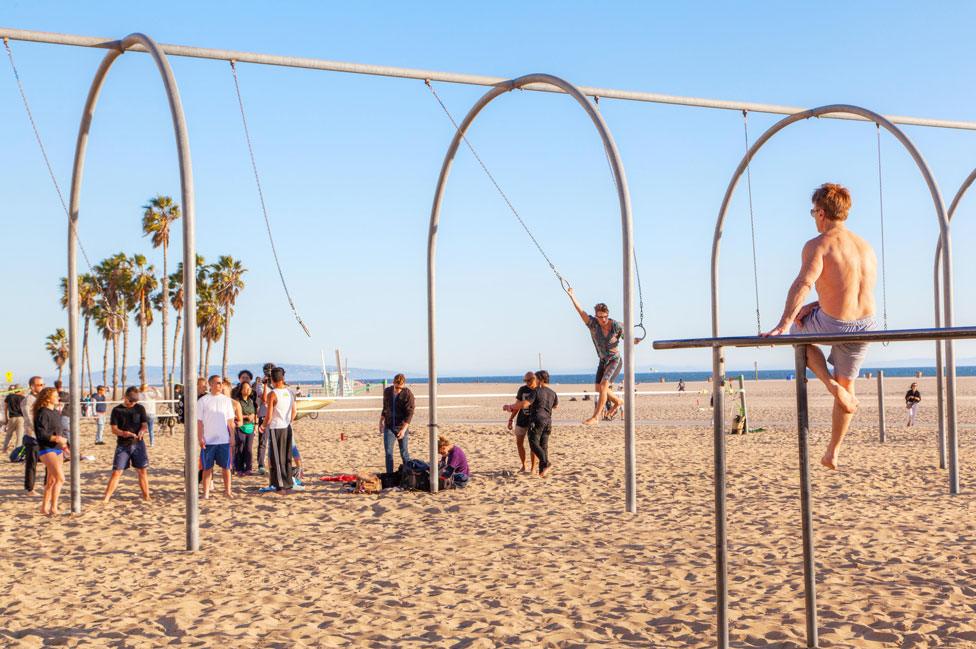
There's an aspirational quality that few states can match
In his inaugural address, the newly sworn-in governor did, in fact, talk about dreams, although he styled his progressive priorities as the "California dream" - of good jobs, quality education and a comfortable retirement.
"Not to get rich quick or star on the big screen, but to work hard and share in the rewards," Mr Newsom said. "To leave a better future for our kids."
After the speech, Los Angeles Mayor Eric Garcetti - who is contemplating his own presidential campaign - expanded on the governor's thoughts.
"Certainly people dream in other states, but nobody talks about the Missouri dream or the Alabama dream," he says. "This is a unique place that almost the whole world knows, even if they've never been here. They feel California as at once an idea and a place."
As if to drive home the point that California politics and the Trump administration are headed on an ideological collision course, just a few days after Mr Newsom's inaugural salvo, the president lashed out at the state via Twitter, external, threatening to withhold disaster relief funds for victims of the state's recent spate of fatal forest fires "unless they get their act together".

A golden age for Democrats
California Democrats dreaming big - and holding their state up as an example to the rest of the US and even the rest of the world - could seem in some ways inevitable. The most formidable state in the US, run by progressives under progressive policies, would appear destined to produce ambitious politicians intent on translating the success of their state into national prominence.
This sense of inevitability, however, is a relatively recent development.
"California is a funny place," says UCLA lecturer and former Los Angeles Times reporter Jim Newton. "You don't have to look back very far for it to be fairly reliably Republican. This notion of it being an absolutely rock solid Democratic bastion is a relatively new phenomenon."
Mr Newsom's inauguration, in fact, marked the first time since the 1870s that two Democrats in a row have occupied the California governor's mansion. Ms Harris is the first California politician to seek the Democratic presidential nomination in a quarter century.
Part of the reason for this is generational. Jerry Brown, California's governor for the last eight years, was in his 70s during his second stint in office, after serving two terms in the 1970s and early '80s. He had already run for president three times, in 1976, 1980 and 1992, and his national ambitions were long since dimmed.
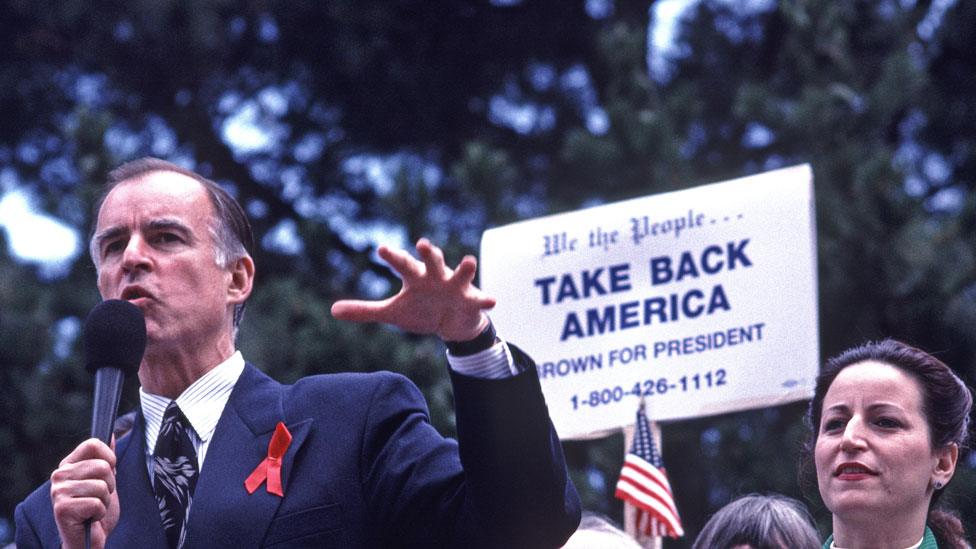
Jerry Brown campaigning in 1992
Dianne Feinstein, the state's senior senator, is in her 80s, and Ms Harris predecessor, Barbara Boxer, never showed interest in a White House bid.
With a new cadre of Democrats taking the reins comes new ambitions.
It's more than that, however. For long stretches over the past three decades, California has been an economic basket case. The state was devastated by the recession of the early 1990s, the tech bubble collapse of 2002 and the Great Recession in 2008.
"In 2010, the conventional wisdom was that California was headed the way of Greece; that it was ungovernable" says Newton. "People were openly debating the question of what would happen if a state the size of California declared bankruptcy. It was called, quite literally, a failed state."
Part of the reason California suffers so grievously in times of economic downturn is because the state is heavily dependent on income and corporate taxes as a revenue stream. When people and corporations make less money, once bursting government coffers quickly go empty.
And so while California Democrats are touting the opportunities that California can present as a model of progressive success, the flip side of this opportunity is danger. If California fails - if it slips back into an economic morass - it will quickly become a conservative cautionary tale instead of a liberal beacon.

The Gray ghost
In a front row at Mr Newsom's inauguration, like a ghost of presidential ambitions past, was a man who provides a telling example of just how quickly California fortunes can change.
Democrat Gray Davis was elected governor of California in 1998, breaking a Republican hold on the job that stretched back to the end of Mr Brown's first stint in 1982. The Golden State was booming, and government spending shot up. The milquetoast Davis was even being bandied about as a future presidential contender.
Shortly after Mr Davis's 2002 re-election, however, the dotcom collapse eviscerated California's economy. Revenues plummeted, and Mr Davis' attempts to raise state fees to compensate led to a voter rebellion that ended in his 2003 recall election and replacement by actor-turned-Republican-politician Arnold Schwarzenegger.
After Mr Newsom gave his speech, Mr Davis reflected on his experience.
"Recessions can take a $15 or $20bn surplus and make it a $15 or $20bn deficit," he says. "I think [Mr Newsom] appreciates all the hard work and tough decisions that led to this phenomenal surplus, and I don't think he wants to be the person who squanders that."
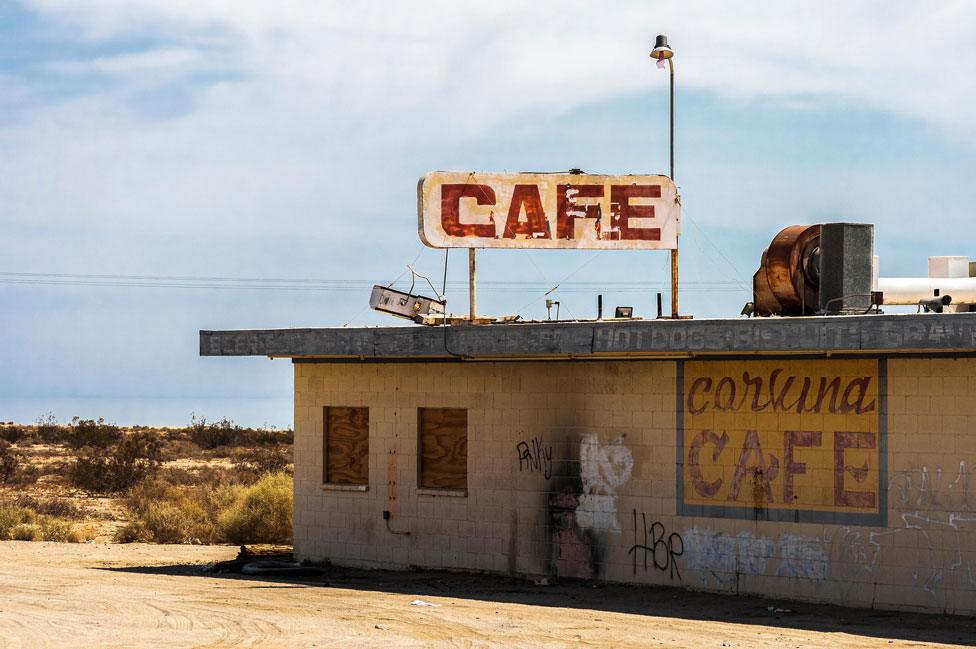
Memories of California's boom and bust past are still fresh
Already there are some dark linings to the silver clouds of Californian prosperity. Profits - and stock valuations - for high-profile Silicon Valley companies like Apple, Facebook and Tesla are down.
Property values, which have been skyrocketing, are starting to soften. And in major metropolitan areas where they aren't, working-class families have long since been priced out of desirable homes and neighbourhoods.
While the state leads the way in economic growth, it is also tied with Louisiana and Florida for the highest poverty rate in the US, at 19%. More than 130,000 Californians are homeless, with Los Angeles second only to New York City among US cities.
"It's a complicated story," says Whalen. "I can take you to parts of California, and you will fall in love with it. But there are problems with the blue paradise, as well."
If the economy falters, the problems that Whalen suggests - homelessness, a lack of adequate healthcare, overcrowding and traffic in the cities, and an uneven quality of public education - will get worse as the money dries up.

Risk and reward
The progressive challenge over the coming months will be to find a way to enact their priorities on healthcare, the environment, education and immigration while insulating the state from the business cycle's inevitable downturn.
Their success or failure will clearly impact upon the national ambitions of men like Mr Newsom and Mr Garcetti, but even Ms Harris - whose presidential campaign will try to cast a broader net - could be tarnished.
Already the senator is taking heat for her time as the state's attorney general and a San Francisco city prosecutor, during which critics say was she was not sufficiently supportive of criminal justice reform. If the Democratic regime in California, of which she was recently a part, oversees a budgetary train wreck in the coming year, it will be difficult for her campaign to emerge unscathed.
Whalen doesn't think Democrats are up to the task. UCLA's Newton, on the other hand, sees this as the party's biggest challenge - and opportunity.
"There's going to be a downturn, and how Newsom handles that really will help send the message of whether this state is something different or just better than most at riding an upward business cycle," he says.
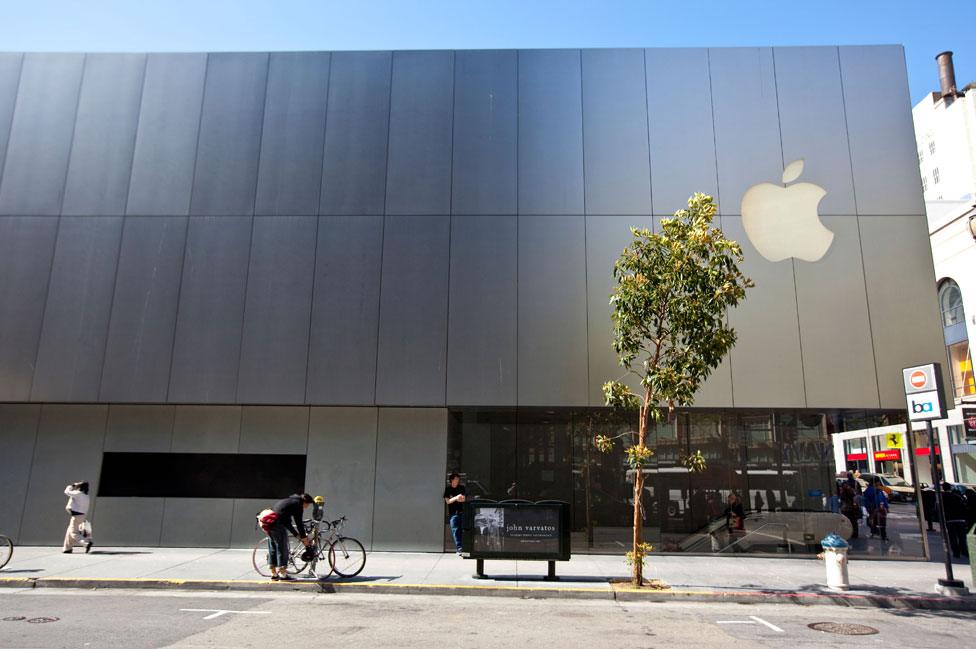
Apple has endured a tough time
And even if the things stay stable, the cadres of ambitious California Democrats - including Ms Harris, Mr Garcetti, Mr Newsom, and others - will have to prove that their state really is a model that can be applied to the nation as a whole.
"For this state to be meaningful beyond electing liberal leaders," Newton says, "it has to show that there is something qualitatively different about what it's like to live under this government than it is under a Trump government.
"If this is a state that can manage wealth, that can handle downturns, it can balance economic growth and environmental protection, that can be welcoming to immigrants at a time when the rest of the country is unsure of that, that's a genuine counterproposal."
In the days and months ahead, this progressive counterproposal will be put to the test - in California and among Democratic primary voters across the US.
Follow Anthony on Twitter, external
.